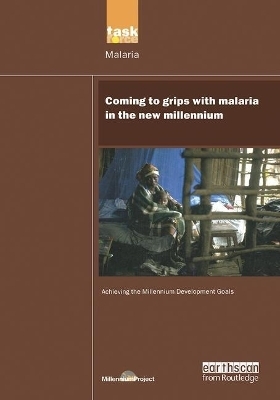
UN Millennium Development Library: Coming to Grips with Malaria in the New Millennium
Routledge (Verlag)
978-1-138-47184-9 (ISBN)
The Millennium Development Goals, adopted at the UN Millennium Summit in 2000, are the world's targets for dramatically reducing extreme poverty in its many dimensions by 2015¿income poverty, hunger, disease, exclusion, lack of infrastructure and shelter while promoting gender equality, education, health and environmental sustainability. These bold goals can be met in all parts of the world if nations follow through on their commitments to work together to meet them. Achieving the Millennium Development Goals offers the prospect of a more secure, just, and prosperous world for all.
The UN Millennium Project was commissioned by United Nations Secretary-General Kofi Annan to develop a practical plan of action to meet the Millennium Development Goals. As an independent advisory body directed by Professor Jeffrey D. Sachs, the UN Millennium Project submitted its recommendations to the UN Secretary General in January 2005.
The core of the UN Millennium Project's work has been carried out by 10 thematic Task Forces comprising more than 250 experts from around the world, including scientists, development practitioners, parliamentarians, policymakers, and representatives from civil society, UN agencies, the World Bank, the IMF, and the private sector.
Coming to Grips with Malaria in the New Millennium presents an innovative strategic framework for relieving the burden that malaria imposes on society through the implementation of tried and tested anti-malarial interventions designed to improve health nationally and to promote economic development locally. Recommendations include early diagnosis, treatment with effective anti-malarial medicines, the use of insecticide treated nets, indoor residual spraying, managing the environment, improving housing, extending health education and improving monitoring and evaluation systems.
UN Millennium Project
Foreword -- Working group members -- Preface -- Acknowledgments -- Abbreviations -- Millennium Development Goals -- Executive summary -- 1 Introduction -- The Millennium Development Goal and target for malaria Organization of this report -- 2 The resurgence and burden of malaria -- Health burden -- Economic and social burden -- 3 Review of major initiatives and institutional policies for malaria control -- Global Malaria Eradication Program -- Global Malaria Control Strategy -- Harare Declaration on Malaria Prevention and Control -- Multilateral Initiative on Malaria -- Roll Back Malaria initiative -- Abuja Declaration on Roll Back Malaria -- Medicines for Malaria Venture -- Global Fund to fight AIDS, Tuberculosis, and Malaria -- 4 Malaria control strategies -- Disease prevention strategies -- Disease management strategies -- Epidemic prevention and control strategies -- Information, education, and communication strategies -- Monitoring and evaluation -- 5 Examples of successful scale-up of malaria control programs -- Tigray region of Ethiopia -- Highlands of Madagascar -- Viet Nam -- South Africa -- Tanzania -- Lessons learned -- 6 Priority challenges fo r scaling up malaria control program s -- Strengthening health systems -- Human resources capacity -- Social mobilization of communities -- Partnerships -- Programmatic challenges -- 7 Developing a global plan to achieve the Millennium Development Goal target fo r malaria -- Conditions for achieving a sustained impact -- Developing a global plan for reducing the burden of malaria -- Components of a global plan -- Needs assessment: costing and financing -- Resource mobilization: needs assessment at the global level -- Resource mobilization: needs assessment at the country level— Ethiopia -- 8 Monitoring and evaluation -- Monitoring and evaluation of health programs -- Malaria-related Millennium Development Goal, targets, and indicators -- Coverage measures -- Main approaches to data collection for monitoring malaria control -- Monitoring the effectiveness of antimalarials and insecticides -- Developing geographic information systems and remote sensing -- Cost-effectiveness of service provision -- Linkage of malaria monitoring with poverty alleviation -- 9 Research and development to meet current and future needs -- Antimalarial medicine development -- Malaria diagnostics -- Malaria management in young children -- Malaria vector -- Malaria vaccines -- 10 Recommendations -- 1. Establish a realistic and measurable target on malaria -- 2. Enhance political commitment at country and global levels -- 3. Strengthen health systems at national and district levels -- 4. Develop human resources for program implementation -- 3. Promote social mobilization and community participation -- 6. Provide effective antimalarial supplies and commodities -- 7. Apply an integrated package of interventions -- 8. Scale up malaria control efforts to national level -- 9. Promote social and economic development -- 10. Incorporate malaria prevention and treatment approaches into school curricula -- 11. Develop surveillance systems for early detection of malaria epidemics -- 12. Promote partnerships for malaria control -- 13. Secure affordable access to the latest medical and therapeutic discoveries -- 14. Invest in research and development on malaria control tools -- Appendix 1 Estimated costs of scaled-up malaria control efforts in Ethiopia ,2005-15 -- Notes -- References.
| Erscheinungsdatum | 01.10.2020 |
|---|---|
| Verlagsort | London |
| Sprache | englisch |
| Maße | 178 x 254 mm |
| Gewicht | 485 g |
| Themenwelt | Studium ► Querschnittsbereiche ► Epidemiologie / Med. Biometrie |
| Studium ► Querschnittsbereiche ► Infektiologie / Immunologie | |
| Sozialwissenschaften ► Soziologie ► Spezielle Soziologien | |
| ISBN-10 | 1-138-47184-4 / 1138471844 |
| ISBN-13 | 978-1-138-47184-9 / 9781138471849 |
| Zustand | Neuware |
| Haben Sie eine Frage zum Produkt? |
aus dem Bereich


